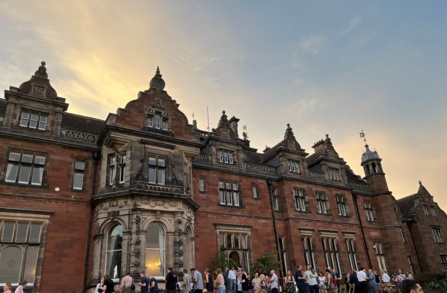Over the past two days, Sian and I attended a 2-day conference at the University of Keele. It gathered together all of the Wildlife Trusts across the UK, to talk all things general election.
You might think, what has the general election got to do with The Wildlife Trusts? The next government will fundamentally shape how the climate crisis is dealt with, so it’s the last chance to turn policy around to favour nature and set the direction of how we can recover and restore nature by 2030.
Here’s a list of a few of the hot topics of conversation:
- Local issues: Local issues will really matter in the next general election. With the current cost of living crisis, it’s evident that local communities will be a focus of the election. The Trusts can work together with their local communities to make change happen within policy by working with their local MPs. If MPs are supporting nature recovery and helping change policy to favour nature, they’ll gain voters and we (as the Trust and nature supporters) will be helping to restore nature by 2030. It can be a great mutually beneficial system!
If you’d like to help support the Trust’s call to seeing restoring nature by 2030 in all Party election manifestos, you can show your support here: https://action.wildlifetrusts.org/page/130179/petition/1?locale=en-GB
- Social prescribing: There was also talk about social prescribing and how important nature is to health. The National Academy for Social Prescribing described how there’s a disconnect between cities and nature, and how being in nature is apart of our human fundamental needs. It could save the NHS money, and reconnect people with nature.
- Engaging young people: There’s a need for more engagement with 16–25-year-olds. Young people are seeing themselves as part of a generation, rather than a national sense of belonging, and are feeling disconnected. To increase engagement, there’s the need to go into their local communities, talk to them and let them give their thoughts. They know more than some think, especially due to being connected to what’s currently happening via social media. They’re the next generation who’ll be heavily affected by the climate crisis, so their voices and engagement are important.
Within the Trust, there is a group called Next Gen Nature who provide peer support to young employees across the Movement, to ensure young voices are valued and to empower young people to make a difference. This is great to see and something we’ll hopefully get involved with!
If you’re a young person who’d like to have more of a say, see if your local area has a youth board or council. Speak to your MP about how you feel, but rather than a template letter, perhaps use school children to write a few words and link it to people in your community, as it’ll be far more effective than a standard letter that’ll most probably not be read. Make it engaging and something they have to read! If you’d like some inspiration on how to get involved in your community, check out Nextdoor Nature: https://nextdoornaturehub.org.uk/.


